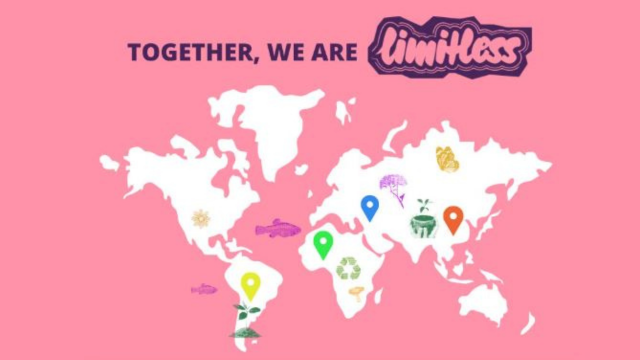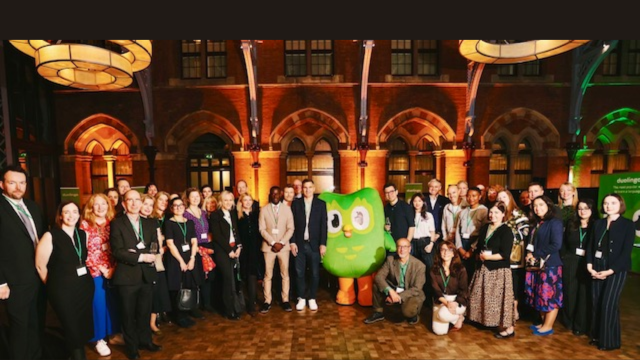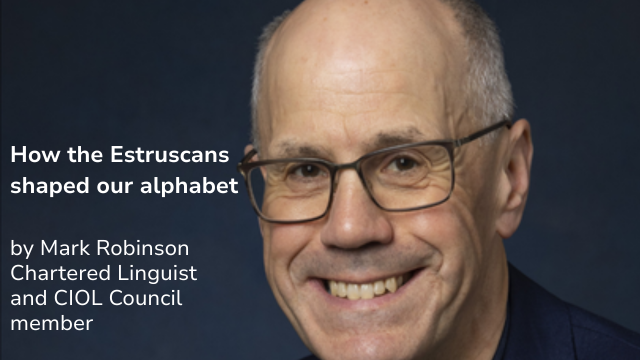-
QUALIFICATIONS
- For Linguists Worldwide
- For UK Public Services
- Preparation
- Policies & Regulation
-
MEMBERSHIP
- Join CIOL
- Professional Membership
- Affiliate Membership
- Chartered Linguist
- Already a member?
- Professional conduct
- Business & Corporate Partners
-
LANGUAGE ASSESSMENTS
- English
- All Other Languages
-
CPD & EVENTS
- Webinars & Events
- CIOL Conferences
- Networks
- CIOL Mentoring
-
NEWS & VOICES
- News & Voices
- CIOL eNews
- CIOL Awards
- The Linguist Magazine
- Jobs & Ads
-
RESOURCES
- For Translators & Interpreters
- For Universities & Students
- Standards & Norms
- CIOL & AI
- All Party Parliamentary Group
- In the UK
- UK Public Services
- Find-a-Linguist
Positive about Languages – why there has never been a better time to be a linguist.

I’m delighted to have the opportunity to meet with a group of such distinguished linguists and managers of highly specialised language services. I am a languages graduate myself and call myself a linguist, but I am acutely aware that my skills are very amateur indeed compared to yours, despite some decades ago actually having worked and volunteered as an interpreter now and again.
But I am glad to have the platform of the all party parliamentary group on ML which I co-chair not only to promote the teaching and learning of languages but to sing the praises of linguists. The strategic importance of linguists goes largely unnoticed and unsung, despite being so vital.
Other disciplines, such as classics, science and history, have thrown up high profile media figures and glossy, popular TV programmes. But there are no TV linguists to help fire up the interest of the next generation in learning a language. I think that it’s because language and the cultural knowledge that goes with it is not only an academic and intellectual discipline in its own right, it’s also a vital enabling ingredient running through all other disciplines. So people don’t quite know where to place languages and so they become, or remain, invisible or taken for granted.
Indeed, some people think that now we’ve left the EU, we needn’t bother to learn languages any more. I’ve heard plenty of anecdotes from school teachers saying that their students are sighing with relief that they don’t need to bother with their French lessons any more because they won’t need it in future. What a contradictory world these young people live in: on the one hand retreating into a post brexit little island mindset, and on the other, being in instant contact every second of the day via their smart digital devices with anyone and everyone in the world.
Some people think that now we can always turn to Google Translate, we needn’t bother to learn any languages ourselves because a machine will do the job.
And some people think everyone speaks English anyway, so what’s the point of making an effort?
You of all people don’t need telling that these are all dangerous myths. In the 21st century, English – important though it is - is not enough. Speaking only English is as much of a disadvantage as speaking no English.
In fact, only 6% of the world’s population are native English speakers and 75% speak no English at all.
In a post brexit world where the UK seeks to redefine its place and establish leadership in international relations, security and soft power, negotiating umpteen new free trade agreements, young people will need languages more than ever for the culturally agile, mobile and interconnected jobs of the future.
The amount of internet content in English is declining, with Mandarin increasingly rapidly. Arabic is the most used language across all social media platforms. There are more blogs in Japanese than in English. And French and German still regularly come top of UK employers’ skill-set wish list.
As for machine translation, while it undoubtedly has its place, it can never replace humans when it comes to nuance, cultural sensitivity and complex understanding or meaning. The excellent language training by the diplomatic service, the armed forces, police and security services is testimony to the importance of real people making a crucial difference with their language skills.
On a different level altogether, you probably saw the amusing story that made the media headlines a few months ago now to illustrate the pitfalls of turning to google. A supermarket in Wales was re-doing all its signage above the aisles and one of the new categories it had to put up a sign for in Welsh as well as English was alcohol free drinks. Well, the machine wasn’t very well up on the importance of word order and it turned out that the Welsh version said ‘free alcohol’ instead of ‘alcohol free’.
We can only shudder to think of what the infinitely more serious consequences might be if machines not people were doing the translation and interpreting for soldiers on deployment, or if algorithms rather than specialist linguists were listening in to what might be crucial detailed information about terrorists or people traffickers.
The demand for language skills has never been greater. British companies are losing out on £50 billion-worth of contracts every year because of a lack of language skills in the workforce. That amounts to 3.5% of GDP. Yet astonishingly, neither the government’s Industrial Strategy nor the Export Strategy even mentioned language skills.
But over 70% of UK employers say they’re unhappy with the foreign language skills of British school leavers and graduates and are forced to recruit from overseas to meet their needs. Languages are in demand in practically every sector and SMEs in particular seem to understand that they’re missing out. 83% of them operate only in English, yet over half of them say that language skills would help expand business opportunities and build export growth.
If that’s a glimpse of the demand, let’s have a look at the supply side of the equation.
Sadly, out of the 164 universities in the UK, only 62 are now offering modern language degrees. The total number of modern language graduates has declined by 54% in the last decade or so. And even if every single one of the students currently doing languages went into teaching, we still wouldn’t meet the officially predicted shortfall in MFL teacher numbers.
The EBacc had managed to increase take-up of languages at GCSE but this now seems to have stalled at just under a half of all pupils, compared to well over 80% before the subject was made optional after the age of 14. And A-level languages are in freefall, especially German.
Another factor to consider is the current trend for foreign language skills to become the preserve of a privileged educational elite. Languages up to age 16 are compulsory in 70% of independent schools but in only 16% of state schools.
And there are stark regional weaknesses in participation and attainment in foreign languages, which correlate with regions of poor productivity and low skill levels. In the north-east in 2016, only 43% of pupils sat a GCSE in a language, compared to 65% in inner London – and this gap has been widening year on year.
I must mention at this point an important opportunity coming soon for the business people amongst you to do something about this. The Skills and Post 16 Education Bill currently going through Parliament will provide for local employers and their organisations to exert significant influence on what local education providers actually provide, through a new system called Local Skills Improvement Plans. So this is your chance to put your money where your mouth is and put pressure on providers to teach languages – and not just to people who want to be linguists, but to everyone, whatever their discipline, occupation or sector, because whatever level they’re at, their employability will be enhanced if they have even just a basic working knowledge of another language.
Now against all of this stark and miserable background, some of you may be wondering why this talk was called ‘Positive about Languages’….well I’m about to hit you with an impressive list of facts, figures and recent research findings which I’m sure will make you proud and positively evangelical about languages and linguists. Here it comes, in no particular order:
One, I met with the new Schools Minister recently and he made it very clear that he regards modern languages in schools as a – and I quote – ‘most urgent priority’.
Two, taking a year abroad as part of your degree, whether you’re a linguist or not, makes it 19% more likely that you’ll get a First.
Three, that crucial year abroad again: people who take it are 23% less likely to be unemployed after graduation. And Four, this is all because employers consistently say how much they value graduates who have had some international and cross-cultural experience. One study in the US reported that employers rated language skills and an international and cross cultural mindset as even more important than expertise in STEM subjects.
Five, the Institute for Fiscal Studies says that 5 years after graduation, the median earnings of modern language graduates is well into the top half of the earnings table, higher than graduates in law, biological and physical sciences, business or psychology.
Six, thanks to lobbying by the All Party Parliamentary Group on modern languages, and others, the government has now included all MFL teachers on the Shortage Occupations List for immigration purposes. Previously, only teachers of Mandarin were on the list, but now it’s everyone. This means that, post brexit, and in principle, it should still be easy to recruit MFL teachers from the EU and elsewhere, which is just as well, because until we can produce enough of our own, language teaching in schools is seriously threatened by a very thin supply chain, with over a third of MFL teachers being EU nationals. I think the List should also include public service interpreters, but that’s a battle I’ve yet to win.
Seven, the Ministry of Justice has recently announced a full and independent review of the standards and qualifications which should be required of interpreters in our courts and tribunals. This came about as a result of discussions I had with the government in the context of the Police, Crime, Sentencing and Courts Bill, and will I hope result in clarity, higher standards which will squeeze out unqualified so-called interpreters, and greater recognition of the highly specialised and professional work carried out by public service interpreters.
Eight, groundbreaking research was published by Cambridge University a couple of weeks ago on the economic value to the UK of learning and using other languages, with the headline finding that if we taught more people French, Spanish, Mandarin and Arabic, we could increase UK exports by £19 billion a year.
Nine, the language centre at the Foreign Commonwealth & Development Office now provides training in 86 different languages and the Defence Academy for Language and Culture in 40. Our Ambassadors abroad are frequently complimented on the language skills of our embassy staff, at all levels, and the UK has acquired a good reputation for our language competence when in post. The armed forces and the metropolitan police now require language skills for promotion. When we put our minds to it, we Brits can do brilliantly at languages.
And Ten, as an example, smart businesses who promote and make use of language skills have achieved a 43% higher export to turnover ratio.
And finally, I can’t resist including that we now know for sure that languages are good for your health. Robust research from Edinburgh University has shown that learning and using another language can delay the onset of Alzheimers and all forms of dementia for up to 5 years, and can also be of significant help in cognitive recovery after a stroke.
I’m sure there are other things I could have listed, but that will at least give a flavour of what’s at stake and how exciting the languages landscape is, both professionally and personally, right now.
But I’d like to end on a different note altogether if I may. I want to mention and pay tribute to the work of some interpreters and translators who work in much less safe and salubrious conditions than we all do.
First, the Afghan interpreters who worked alongside the British armed forces in Afghanistan. The role of interpreters and translators in conflict zones is absolutely vital but is poorly understood and rarely acknowledged. They are unsung heroes. They are often the victims of distrust, discrimination and threats from all sides; indeed, there is a syndrome known as the translator-traitor mentality, in other words the assumption that the local, civilian translator or interpreter isn’t doing a neutral, professional job but must be working for the other side, whoever that happens to be. Yet their linguistic skills and cultural knowledge are often the very things which enable the uniformed troops or the journalists to do their job.
Both before and since the Taliban takeover last summer, the Afghan interpreters and their families have been subject to intimidation, threats, kidnapping, and killings. To our credit and under various schemes, we have to date managed to relocate about 7000 of them plus family members to the UK. But many others remain and are in hiding or in fear, or have fled to a third country where it is difficult if not impossible to engage with the bureaucracy required to get a visa to come here.
Many of you will probably be aware of the campaign being spearheaded by the NGO Red T and various other professional bodies representing the interests of interpreters and translators, and which I strongly support, which is to persuade the UN Security Council to pass a resolution on the protection of civilian interpreters in conflict zones.
There is already a Security Council resolution on the protection of journalists in conflict zones, but nothing equivalent for interpreters. At the end of a conflict, journalists go home, but interpreters on the whole remain there because they are locals, and they are frequently vulnerable, like the Afghans, to kidnap, threats, torture and death from parties who perceive that they have been working with the enemy in the conflict.
In Iraq, interpreters had to work with masked faces in fear of retaliation by insurgents. In China and in Turkey, interpreters have been imprisoned on the assumption they agreed with the content of their words rather than being their impartial conveyors.
Interpreters and translators also play a vital role– and again, largely hidden and unappreciated – in humanitarian aid and health emergencies. I’ve been involved with a splendid international NGO called Translators Without Borders, who provided interpreters and translators to work alongside the health professionals in Sierra Leone and other countries where the ebola crisis has broken out. And more recently have been deployed into refugee camps in Bangladesh to disseminate accurate information about Covid and vaccinations in the right languages.
I think the value of language specialists is now much better understood than it used to be, both domestically and in international relations. And the beauty of languages is that there’s a win-win waiting to be claimed. The UK’s success post brexit will require cultural intelligence and agility, whether in business, diplomacy or research. Not everyone needs to be a specialist professional linguist, but my goodness we need a lot more of you too. Whether in delivering better public services, in justice or in health care, improving human rights or negotiating trade deals, the social advantage, the economic advantage and the soft power advantage in the 21st century surely belongs to the multilingual citizen and nation, not the blinkered Brit of the past. You as linguists are in a fantastic and enviable position, professionally and personally, and I thank you sincerely for the vital work you do, even if there is still some way to go before your pay and status is always commensurate with your contribution to society.
Baroness Coussins is a Vice President and Honorary Fellow of the Chartered Institute of Linguists
Views expressed on CIOL Voices are those of the writer and may not represent those of the wider membership or CIOL.
Filter by category
More
The Chartered Institute of Linguists (CIOL), Incorporated by Royal Charter, Registered in England and Wales Number RC 000808 and the IoL Educational Trust (IoLET), trading as CIOL Qualifications, Company limited by Guarantee, Registered in England and Wales Number 04297497 and Registered Charity Number 1090263. CIOL is a not-for-profit organisation.








